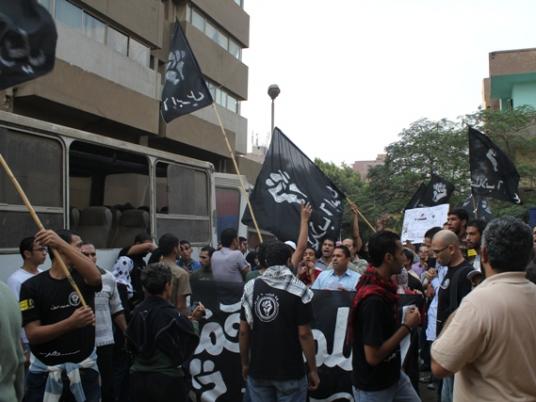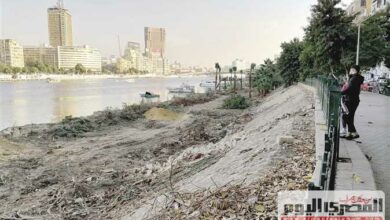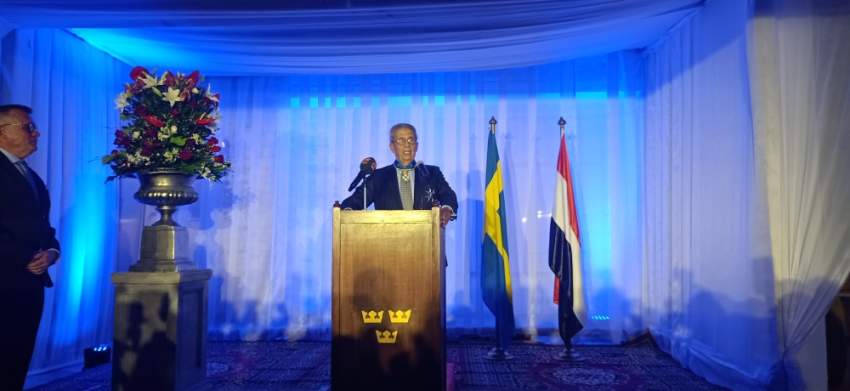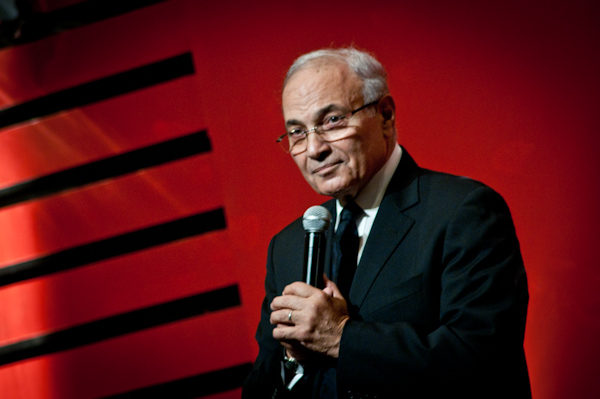
Activists from the April 6 Youth Movement are taking to the ahwas, alleyways and marketplaces of Mansoura and its surrounding villages ahead of the presidential election next week with one, clear message: anyone but feloul.
With fewer than 10 days before Egyptians go to the polls to elect the first post-Hosni Mubarak president, the activists from the April 6 Youth Movement, one of the country’s best-organized and most prominent pro-revolution groups, are passing out fliers, giving lectures and holding conferences to convince voters in the Nile Delta governorate of Daqahlia that they should not elect a candidate affiliated with the former regime, also known as a remnant, or “feloul.”
The campaign aims to convince people not to cast ballots for former regime officials Amr Moussa or Ahmed Shafiq by handing out flyers about their actions during Mubarak’s tenure and, in particular, during the 18-day uprising that led to the former president’s ouster. The campaign members know that some voters will not read the flyers, so they sometimes start casual conversations about the candidates with people in a café or a restaurant.
“Ordinary people and especially those who live in poor villages are fed up with corrupt information from state media,” says April 6 activist Nada Abul Wafa. “This is our role, to refute facts about candidates among them so they can decide who to vote for without any sort of influence from anyone.”
Some see the campaign as a response to comments made by Amr Mousa, a leading candidate who served as Mubarak’s foreign minister a decade ago and then as the head of the Arab League and is often labeled feloul. Two months ago, Moussa spoke out against April 6 and its members, claiming they want to spread chaos and destroy the country. Shafiq is a former minister of civil aviation under Mubarak who briefly served as his prime minister during the president's last days in office.
The campaign launched its work at the beginning of May by organizing a human chain of protesters, mostly university students, holding signs denouncing Moussa and Shafiq and calling for their disqualification. Activists also painted graffiti on the candidates' campaign posters, writing “No feloul!” Later, they showcased a video about Moussa, highlighting a statement he made saying he would support Mubarak for reelection.
A few days later, the campaign began branching out from the city, visiting Aga, a village 15 minutes from Mansoura, where campaign members took to the streets to talk to residents and hand out flyers. The campaigners often reminded residents that voting for candidates affiliated with Mubarak would mean those killed during the revolution had died in vain.
“It’s about time that people really bring down the Mubarak regime. Otherwise, the martyrs died for nothing,” Mohamed Sabry, the coordinator for April 6 in Mansoura, said.
The campaign, with its provocative statements, has gotten a mixed reception from Mansoura area residents. While most seem to agree that they need to vote for someone who cares about the revolution and the people’s needs, they often disagree on what and who this means.
“The problem is that most people never heard of the candidates and they only know Moussa and Shafiq because of their appearances on many talk shows as former ministers,” said Ahmed al-Helaly, a resident of Belqas.
In Belqas, another village just outside of Mansoura, the campaign found it difficult to convince people.
“Some people just don’t want to listen and most people here already have their minds set on a feloul candidate,” said Amal al-Mahdy, a member of the campaign. According to an opinion poll released earlier in the week by Al-Ahram Center for Political and Strategic Studies, Moussa leads the field and Shafiq is in second. Polls conducted by other organizations have varied widely.
Some villagers have proven receptive, however. “I’ll never vote for him [Moussa] because when people were dying during the revolution he didn’t take any real steps to stop the bloodshed and that means either he was afraid or was flattering the regime,” Aga resident Nehal Gamal said when April 6 stopped there.
Many residents also expressed their growing dissatisfaction with the Muslim Brotherhood. Ahmed Ali, a resident of Belqas, said he would “never vote for the Muslim Brotherhood again” as they have “proven that they know nothing about what Egypt needs,” referring to their recent work in Parliament. On the other hand, Ali thinks that with Moussa’s experience working as a minister during the Mubarak regime, “he can correct much of the country’s current misfortunes.”
In Mansoura, the campaign has continued to attract a growing number of participants. About 60 people are now active in the anti-feloul efforts. Last Thursday, the campaign managed to unite several staff members from other leading presidential campaigns to hold an exposition showcasing “revolutionary” candidates side by side. The Mohamed Morsy, Abdel Moneim Abouel Fotouh, Hamdeen Sabbahi and Khaled Ali campaigns all participated.
Members of these opposing campaigns could be seen talking with one another and offering each other food and drinks. Hana Ibrahim, an April 6 member, said it feels as though “we have the Tahrir spirit again, uniting against a single enemy — feloul.”




